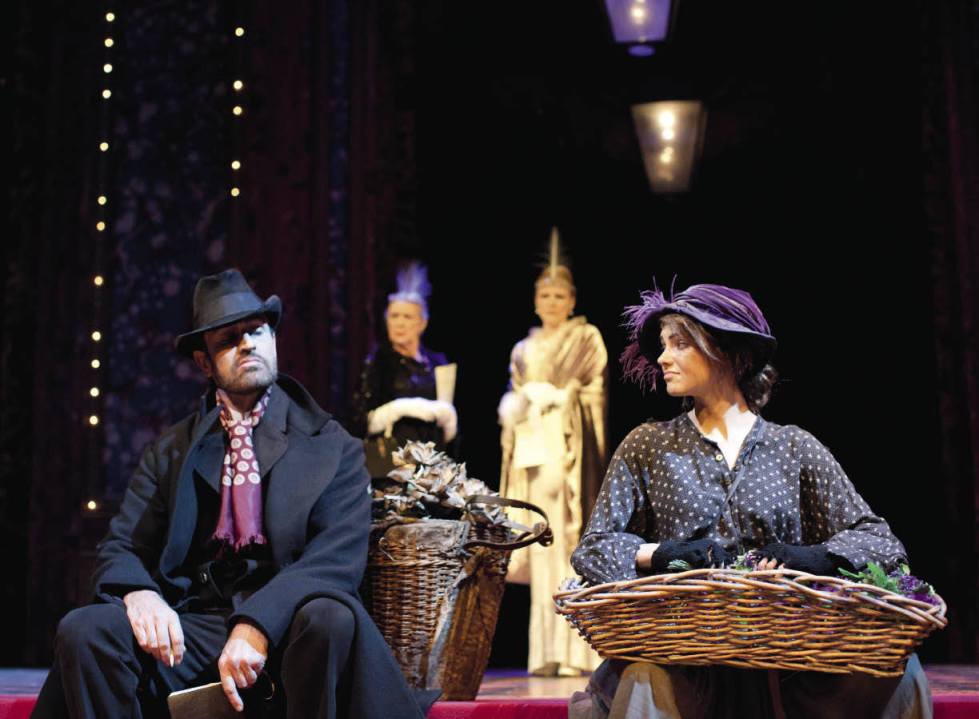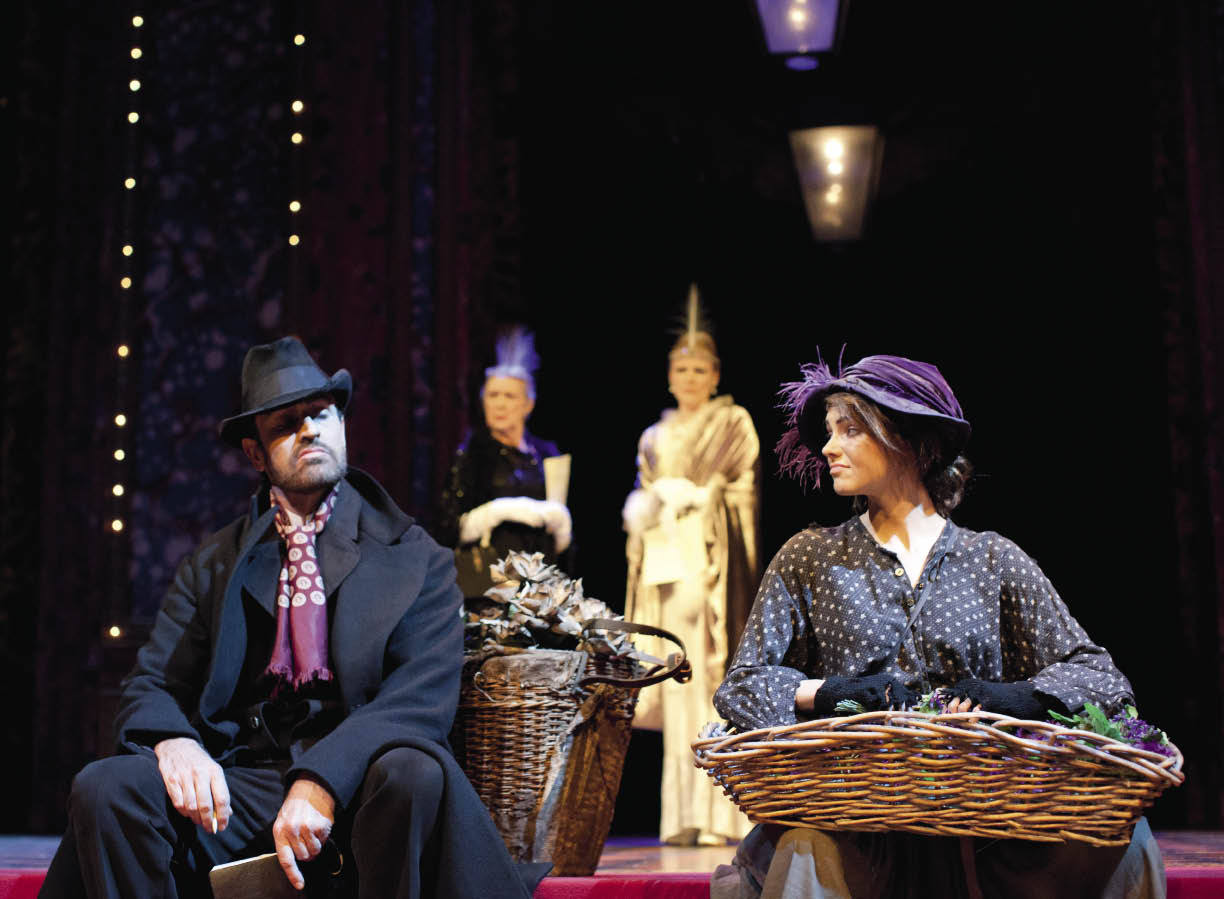Rupert Everett doesn’t care for critics.
Rupert Everett doesn’t care for critics. ‘You see them coming into the theatre,’ he says, ‘like the homeless who’ve lost their soup-kitchen, shuffling in with their plastic bags, deranged and vacant.’ After watching him play Henry Higgins in Pygmalion the reviewers have dumped poor Rupe in the poop. ‘Sad to witness,’ said one. ‘Lacking in intellectual joie de vivre,’ lamented another. ‘Respectable,’ said a third. (I bet that hurt.) And Everett, a leading practitioner of bitchcraft, lashed out and accused his attackers of not being able to afford their own sandwiches.
He’s right to cavil at the cavillers because I can’t remember a more entertaining version of the role. Everett is an odd blend of Higgins and non-Higgins. He’s naturally disdainful and rather cross with the world, and faintly misogynistic, too, so all that comes easily enough. But he erases Higgins’s dusty academic hauteur and replaces it with elegance, a dark magnetism, and an erudite self-mocking warmth. Anyone who has read Everett’s classic Hollywood memoir, Red Carpets and Other Banana Skins, knows that he’s as astute and witty as anyone who ever went west. So the sense of intellectual grip, and joie de vivre come to that, are precisely what he brings to the show. He even makes sense of Higgins’s strangely needy yet perfectly sexless adoration of Eliza. A wonderful comic performance.
There’s excellent support from Peter Eyre (Colonel Pickering), whose voice is one of the loveliest things in the English-speaking world. It’s like an orchestra of oboes wafting across a starlit lake. Higgins’s knowing and exasperated mother is played by Diana Rigg with suitably twinkly grandeur. Kara Tointon, a name unfamiliar to those unfamiliar with primetime telly, starts off very loud and boorish as Eliza but improves rapidly and turns the ‘not bloody likely’ moment into a personal triumph. It’s rare for audiences to applaud the close of every act. Here they applaud the close of every scene.
Richard Bean’s new play at the National is an update of Goldoni’s 18th-century classic, The Servant of Two Masters. The plot is very silly. In fact the dictionary hasn’t enough synonyms for silly to describe how silly it is. Missing twins, mistaken identities, cross-dressing brides and exiled lovers are all involved. The first act culminates with a madcap kitchen routine, where a ravenous waiter serves 18 dishes to two tables simultaneously, while gorging compulsively on the fare as he serves it. Bean sets this caper in the 1960s but the mood is deliberately anachronistic. Irony spectacles in place, he evokes a fake retro version of the decade invented in the 1990s by the nostalgia industry. An East End club is described as being particularly rough: ‘gangsters, villains, Princess Margaret’.
The pace is rapid, the mood insubstantial. Gags flow like water. Many have a racial flavour and an indiscriminate trajectory. Norwegians, Australians, Irishmen and others are all treated to a kicking. Bean’s last play at this venue, England People Very Nice, used racist humour to demonstrate that prejudice is a universal failing. Here it just seems a personal fixation. ‘I wouldn’t trust a Spaniard with a Swiss roll,’ says one character in reference to Iberian priapism. But it’s unclear why Hispanics are a better target for that joke than, say, Italians, Africans, Scots or anyone else. But this is a minor quibble.
The show is a triumph in several senses. It transfers the idiom of the commedia dell’arte into the modern theatre with complete success. The gag-crammed script receives spirited performances from a top-notch cast expertly directed by Nicholas Hytner. And most of the critics have posted raves. And, yet, it’s not about anything. It’s as nourishing as rice paper. Bean is at his best when he takes on a topic that gnaws at his heart. Instead, he’s given us a frothy piece of slapstick which looks set to earn the National a huge haul of treasure as it sets off on a UK tour.
The star, James Corden, is a figure who provokes extreme reactions. Invisible a few years ago, he’s now so overexposed that there seem to be six of him. Enthusiasm was his undoing. Fame arrived on a plate and he couldn’t stop eating. So he managed to create the impression that he’d outstayed his welcome before he’d even taken off his coat. But a talent won’t soar unless the right materials are propelling him upwards and Corden has what it takes. On stage his presence is off-kilter, hard to place. He looks like an insouciant baby. His technical mastery is so advanced that it doesn’t seem like mastery at all and this has the welcome effect of making the audience feel he might be improvising the show in his bedroom or even on the street. Which is ideal. That’s where commedia dell’arte started.








Comments